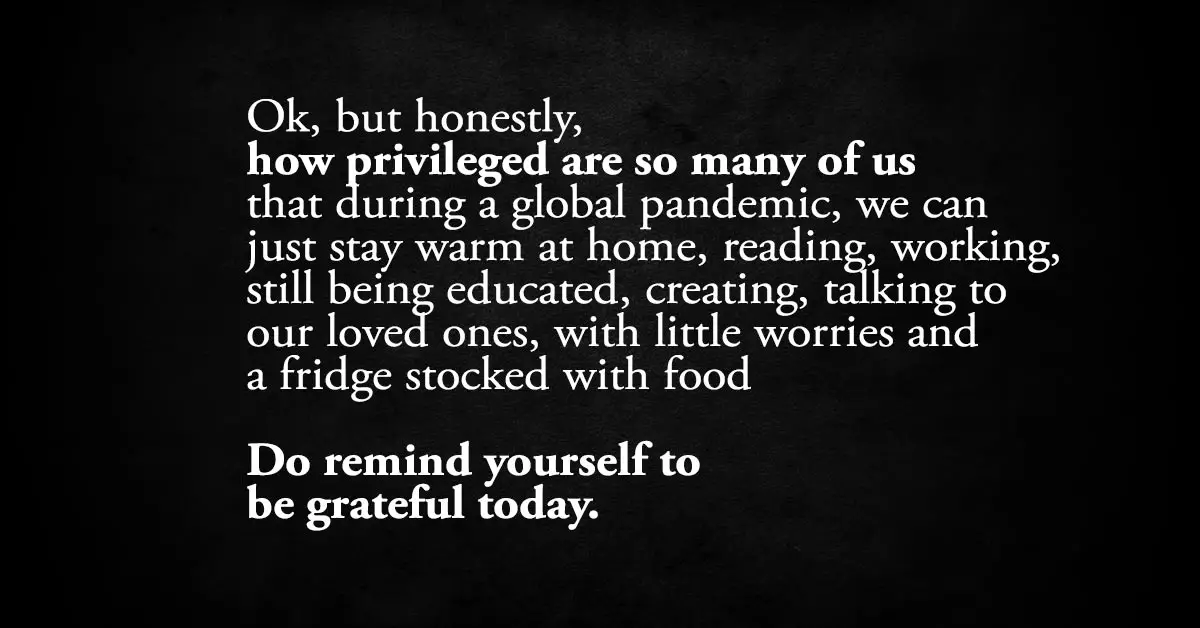I hear a lot of people complain about a wide range of things. From bills that have not been paid to not being able to take that vacation. Some complain about the flimsiest of things. While you may not have everything you want, it is pertinent that you should be grateful for what you currently have. For that small apartment that you keep complaining about, many others are homeless and will give everything they have to be in your position. For every time you can’t afford to treat yourself to an amazing dinner at that posh restaurant, remember that many do not know where their next meal will come from. Now, this is not to mock those who can’t afford it; instead, it is to help you count your blessings and be grateful for the little that you currently have.
“Cultivate the habit of being grateful for every good thing that comes to you, and to give thanks continuously. And because all things have contributed to your advancement, you should include all things in your gratitude.” – Ralph Waldo Emerson

Gratitude is not just an action. On the contrary, it is a deliberate emotion that serves a biological purpose. The Harvard Medical School describes gratitude as “a thankful appreciation for what an individual receives, whether tangible or intangible. With gratitude, people acknowledge the goodness in their lives. As a result, gratitude also helps people connect to something larger than themselves as individuals — whether to other people, nature, or a higher power.“
It can be very easy to lose sight of all that we have and are. Life can hit us with challenges that will threaten to break our spirits. But no matter what the situation is, never forget to be grateful. Look on the positive side of things. That flaw, that mistake, that challenge will teach you lessons you would otherwise not know. That hurt you felt when you were betrayed will teach you to be wiser and stronger.
Appreciate every minute of your life rather than wallow in regret. You never know when your last moment will come.
Why be grateful
The importance of gratitude cannot be underestimated. Gratitude opens doors that will otherwise be closed shut. Gratitude will strengthen interpersonal relationships and forge new ones. Gratitude will motivate you and keep you happy. Gratitude can also lead to higher levels of self-discipline. But that’s not all. Gratitude also has health benefits.
Several studies on gratitude have found that it has scientific benefits as well. In a study conducted by Dr. Michael E. McCullough of the University of Miami and Dr. Robert A. Emmons of the University of California, both psychologists found that grateful people felt better about their lives generally. [1]
In the study, participants were divided into three groups. One group was asked to write a few sentences about what they were grateful for that had occurred during the week. Another group was asked to write about events, whether negative or positive, that had affected them. The third group was asked to write about things that had displeased them or daily irritations. After ten weeks, the first group, which wrote about events they were grateful for, felt better about their lives and were more optimistic. They remained more alert and connected socially. They slept better and were less susceptible to illnesses like infections and headaches. They were also more likely to be in control of situations.
Additionally, they were more connected socially, happier, enthusiastic, and had greater resolve towards achieving goals.
Another study which was conducted by a psychologist at the University of Pennsylvania, Dr. Martin E. P. Seligman, found that the act of gratitude has positive impacts on the well-being of an individual. [2]
In the psychological intervention, which was conducted on 411 people, the participants were given weekly assignments of writing about early memories. When their week’s task was to write and personally deliver letters to someone who they’ve never properly thanked for their kindness, the participants’ happiness levels experienced a huge surge. What’s more? The benefits were vaster than any other intervention, with benefits lasting for up to a month.
How to cultivate the habit of gratitude
Having seen the importance and benefits of gratitude, it is essential to learn to cultivate it if you’ve been lacking. Rather than continually reach for new things in the hopes that they will make you happy, you can focus on what you already have through gratitude. Now, this is not an excuse for you to be ambitionles, but the constant focus on material and physical things will leave you dissatisfied. If you are looking to cultivate gratitude regularly, here are a few tips that may help: [3]
How to be grateful
A great way to cultivate gratitude is to count your blessings and name them one by one. Pick a time, we least twice weekly, to write down your blessings. What are you thankful for? Take time to reflect on events of the week. As you reflect on them, accentuate and think about the sensations these events make you feel.
Send a thank-you note
A number of us are fond of not expressing appreciation of a person’s kindness in our lives. It is very easy to become used to a thing and fail to see the little effort that goes into making that particular thing happen. From your babysitter who has been taking care of your kids diligently to your spouse who gives you a body massage after a long day at work, these people deserved to be thanked for their effort every once in a while. Write a thank-you note expressing your appreciation of that person’s impact in your life. If you can deliver it personally, do it. Make a habit of doing this at least once monthly. Not only will you nurture your relationship with that person, but you will become and feel better and much more satisfied.
Be grateful – and express it too
If you are unable to write a personal note of appreciation, you can also think about a good deed a person has done and thank the person mentally.
Always, always be thankful
As the world currently battles the novel coronavirus, it can be difficult to remain optimistic and thankful. However, when the thought of ingratitude comes, remember that you have a warm home, a fridge stocked with food, and little worries. No matter how bad the situation is, always, always be thankful.
References
- ‘Counting Blessings Versus Burdens: An Experimental Investigation of Gratitude and Subjective Well-Being in Daily Life‘ PubMed. Robert A Emmons et al. Published February 2003.
- ‘Positive Psychotherapy’ PubMed Martin E P Seligman et al. Published November 2006.
- ‘Giving thanks can make you happier’ Harvard Health Publishing. Published November 22, 2011.

